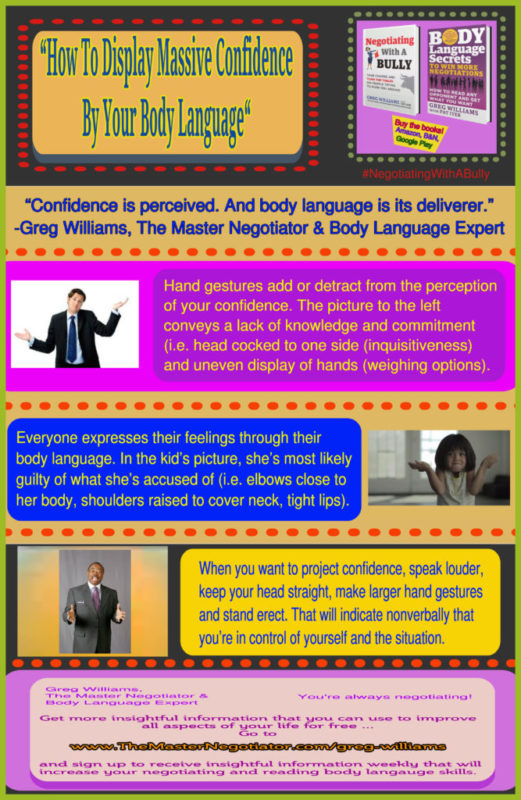“How To Display Massive Confidence By Your Body Language“ – Negotiation Insight
“How To Display Massive Confidence By Your Body Language“ – Negotiation Insight https://csuiteold.c-suitenetwork.com/advisors/wp-content/themes/csadvisore/images/empty/thumbnail.jpg 150 150 Greg Williams, MN, CSP https://secure.gravatar.com/avatar/1f08a50bcaed92eae0990a65c7808a62?s=96&d=mm&r=g

“How To Display Massive Confidence By Your Body Language“
“Confidence is perceived. And body language is its deliverer.” -Greg Williams, The Master Negotiator & Body Language Expert (Click to Tweet)
Your body speaks. It does so through the body language you display to others. Through that, they assess the degree of confidence you possess.
He walked painfully slow and hunched over – people gaped at him as soon as he entered the room. His pace suggested that he wasn’t in a hurry to get anywhere fast. When he spoke, he did so in a low tone that caused others to lean in to hear what he was saying. After he departed, one individual in the room to whom he was attempting to sell his company’s latest product said, “and that’s the sale’s rep they sent to represent their company – they must be having serious problems.”
I’m willing to bet that you didn’t think our slow-walking, slow-talking person was a sales rep. You most likely have an image of salespeople being full of vigor. When your body language doesn’t match expectations, your intent can become misperceived. Worse, others might assume you lack confidence.
The following are ways that you can convey more confidence in the way you use your body language.
Walking Taller:
When you feel threatened, your body contracts. That’s the body’s way of making itself a smaller target. Thus, when you walk hunched over, you’re signaling that you feel unsafe.
To project more confidence, walk erect. Hold your head high and your shoulders back. That’ll signal fearlessness. You’ll become perceived as possessing more physical and mental strength. At that moment, others will be less likely to challenge you and more open to listening to you.
Walking Fast:
Through their pace, fast walking people indicate that they have someplace to be. They’re on the move. Their gesture suggests that they possess energy – energy is something others sense. It’s something that attracts attention.
When walking into a room, walk at a quickened pace – you’ll command attention. Movement attracts our eye. The faster that movement, the more riveting our attention will become to that motion.
Firm Handshake:
The receiver of a handshake makes assumptions about its deliverer. That’s due to the nonverbal information dispatched through handshakes. With a weak handshake, the receiver might assume the deliverer is weak of will. He might also assume that he can manhandle the deliverer.
When shaking hands, consider the message you’re sending. Based on the nonverbal message you wish to transmit, consider shaking someone’s hand based on the firmness of their handshake.
When people meet for the first time, a handshake will usually last for three up-and-down movements. If it’s longer, that may suggest that there’s a powerplay at hand. That means, the person holding the other person’s hand the longest is attempting to exude control. Most likely, he’ll attempt to maintain that control throughout the engagement.
Strong Voice:
An unintended weak voice suggests that the speaker lacks commitment or possesses insecurities. Whenever you wish to sound convincing, use a louder and stronger voice. Raise it a few octaves above your normal speaking voice. That’ll be enough to convey commitment about what you’re saying. You can also add a deeper tone on words you wish to emphasize. That will give those words more meaning. It’ll also enhance the perception of your gravitas.
Smiles and Frowns:
A smile displayed at the appropriate time adds additional meaning to your words. It can turn a sarcastic remark into one of puzzlement (i.e. what did she mean by that). A smile can also deepen a relationship through the warmth of conveyance.
A frown can be very potent. If you wish to display dissatisfaction with someone’s words, let a frown represent your thoughts. By not using words, that person will wonder to what degree you’re dissatisfied with his pronouncements. If he’s not astute, he’ll begin giving you unexpected information.
What does this have to do with negotiations?
Knowing how to read and use body language will give you an advantage in a negotiation. Being able to read and use body language accurately will extend that advantage … and everything will be right with the world.
Remember, you’re always negotiating!
Listen to Greg’s podcast at https://anchor.fm/themasternegotiator
After reading this article, what are you thinking? I’d really like to know. Reach me at Greg@TheMasterNegotiator.com
To receive Greg’s free “Negotiation Tip of the Week” and the “Sunday Negotiation Insight” click here http://www.themasternegotiator.com/greg-williams/

